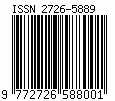Climate risk and financial stability: analysis of the implications of the financing of polluting sectors by commercial banks in the Drc.
Keywords:
Climate Risk, Financial stability, financing, polluting sectors, commercials banksAbstract
Financial stability is a situation in which the financial system, as a combination of financial intermediaries, markets for financial instruments and other products, and market infrastructures, is able to withstand economic shocks and absorb subsequent financial imbalances. While climate change has implications for the security of our banking sector, due to the physical risks it entails, such as extreme weather events, there are also transitional risks, such as the uncertainty associated with the transition to a low-carbon economy.
The Banking Regulatory and Supervisory Authorities, in particular, ensure that they (the banks) correctly detect, manage and report risks, including those resulting from climate change.
Climate risk is a risk associated with the increased vulnerability of companies to variations in climatic indices (temperature, precipitation, wind, snow, etc.). In many sectors of the economy (agriculture and agri-food, energy, textiles, tourism, leisure, construction, etc.), climate risk is far more important than traditional market risk (interest rates, exchange rates, commodities, etc.), and can account for the bulk of earnings volatility. Companies' growing awareness of climate risk explains the increase in climate hedging products, which can take the form of insurance.
This study will enable us to test the resilience of the Congolese banking system to a severe but plausible climate shock, in order to understand climate risks, their variants and transmission channels in the banking system.
Downloads
Downloads
Published
How to Cite
Issue
Section
License
Copyright (c) 2025 Yannick MBO TUANIZO

This work is licensed under a Creative Commons Attribution-NonCommercial 4.0 International License.















